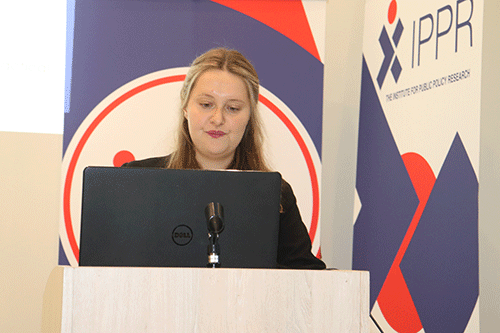The decentralisation of government’s decision-making powers, responsibilities and financial resources, which is referred to as administrative decentralisation, has been more readily implemented in Namibia compared to fiscal decentralisation.
The latter refers to the allocation of tax collection and expenditure responsibilities as well as the establishment of specific budgets and inter-governmental grants for distribution by the central government.
This, according to the Institute for Public Policy Research (IPPR), means that regional bodies have been given limited access to financial powers and resources required to implement development plans.
IPPR’s Kitty Mcgirr during a presentation titled ‘Regional government in Namibia: Is decentralisation a reality?’ yesterday, said there is a need for government to implement more standardised financial distribution mechanisms and to make more concerted efforts toward devolution, especially in regard to regional resource management.
Mcgirr believes subsidies allotted by the finance ministry to Namibian regions have been declining gradually just as the allocated budget for the rural development ministry has decreased.
In her presentation, she concluded that decentralisation, as envisioned in government’s policy, has not yet been meaningfully implemented.
“Where decentralisation has occurred in its more limited forms of delegation and deconcentrating by line ministries, it has often been unevenly implemented such that regional councils are encumbered with more administrative responsibilities without being given access to greater resources and authority to perform their duties effectively,” reads the IPPR briefing paper.
She noted that regions must improve revenue raising capacities by tapping into own resource pools and partnering with other actors beyond central government.
Mcgirr added the majority of intergovernmental fiscal transfers are used for administrative purposes and other recurrent expenditures, with very little left for development and other structural matters. According to Mcgirr, the transfer of administrative functions without adequate human, material and or financial resources is the main obstacle to policy implementation.
Furthermore, she said devolution of centralised powers and functions is not yet a meaningful political reality in Namibia.
Where decentralisation has occurred, she believes it has been implemented in its more limited forms of delegation and deconcentration.
Mcgirr noted that this is crucial to the overall success of decentralisation as, without some degree of financial decentralisation, the transfer of responsibilities cannot be operationalised.
She, therefore, recommended the Office of the Prime Minister apply pressure to relevant line ministries to priortise decentralisation in their strategic plans, including the use of timelines to avoid further delays. She further proposed that the finance ministry completes and implements the drafting of financial disbursement mechanisms from central government to regional and local authorities.
Responding to questions from New Era, urban and rural development minister Erastus Uutoni said the ministry is doing its best to achieve the goal of decentralisation in Namibia.
“There are activities in place that are running and many ministries are coming on board to make sure decentralisation is achieved in Namibia. We all know decentralisation requires financial resources, but there are regions that are on the right track,” Uutoni said.
Commenting on the briefing paper, Popular Democratic Movement parliamentarian Nico Smit said the current government, “was never and will never be serious with decentralisation of power. Cabinet wants to control everything.” -mndjavera@nepc.com.na


